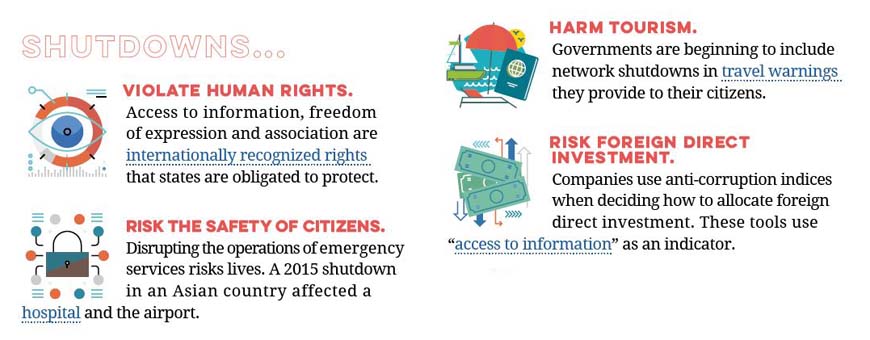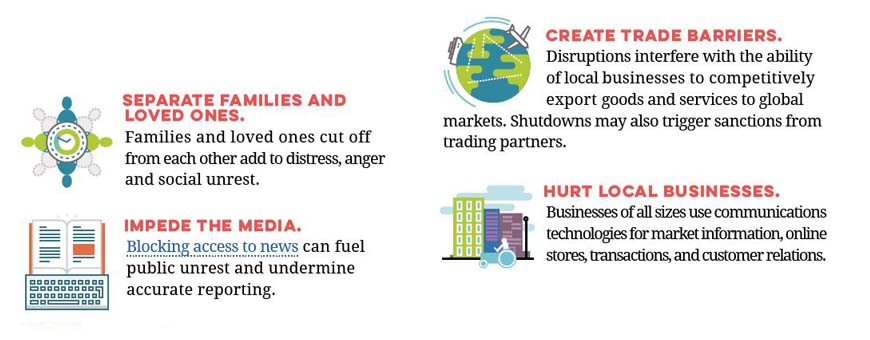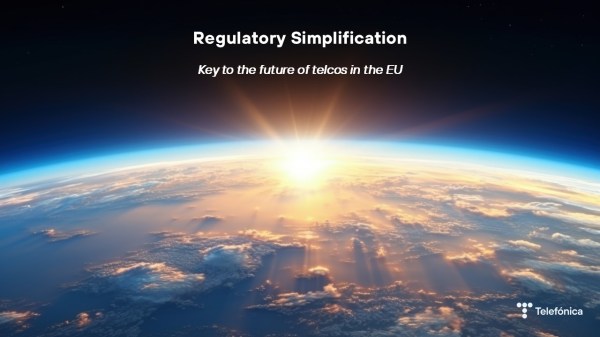 Manuel Ganaza
Manuel Ganaza
Nowadays, the digital world is being more and more important in our lives and unfortunately network shutdowns and service disruptions are being used by some governments as a way to control over the citizens. Government disruptions of networks and services such as SMS, social media, search engines and news sites have spiked around the world in recent years — undermining human rights and economic development, and posing a reputational risk to governments who order them.
For this reason, the Global Network Initiative (GNI) has launched last week a one-page guide aimed at governments who may consider mandating disruptions of communications networks services and online platforms. The GNI is an international multi-stakeholder group of companies, like Telefónica, Vodafone, Facebook or Google, amongst others, civil society organizations, investors and academics who have created a collaborative approach to protect and advance freedom of expression and privacy in the ICT sector.
This one-page recommendation aims to help to businesses, civil society and other multi-stakeholders to give them additional information about how civil society is affected by this networks shutdowns.
In this way, “GNI urges all governments to consult our one-page guide and to weigh carefully the human rights, economic and reputational harms that can flow from the decision to disrupt public access to vital communications services and platforms,” said GNI Executive Director, Judith Lichtenberg. “We hope that by outlining the extensive risks of these tactics, policymakers will better weigh the costs beforehand,” Ms. Lichtenberg said.
The consequences of disruptions include restricting internationally recognized rights to free expression, preventing access to vital emergency, payment and health services, and disrupting contact with family members and friends. In some cases, these mandates pose additional human rights harms when they restrict the free flow of information in the lead up to elections, or are used to target particular regions, districts or ethnic groups.

“Shutdowns chill free expression, impede economic development and local business growth, threaten public safety and increasingly draw global scrutiny” said Mark Stephens, GNI Independent Board Chair and international human right lawyer.
In addition, network shutdowns and restrictions on internet services impact negatively in societies and the economy as a whole. The Internet is the basis of many businesses today and a basic tool for any industry so access interruptions hurt local businesses of all sizes. They imply a loss of 1.9% of GDP per day of network blockage, according to a GNI report called“The Economic Impact of Disruptions to Internet Connectivity”.
Government’s network disruptions are an indicator of instability and it is also an aspect studied by anti-corruption index, where Internet access is a key aspect to be taken into account. Moreover, nowadays the connectivity is essential in our world and the restrictions of access to the network suppose a brake to the commerce and the imposition of borders as important as the physical ones.
For all these reasons, the GNI wants to make governments aware that these practices are contrary to human rights and represent a setback and a brake on the development of their countries. “The immediate gains for governments are often disproportionate to the inherent risks and costs of mandating disruptions” said Mark Stephens.










